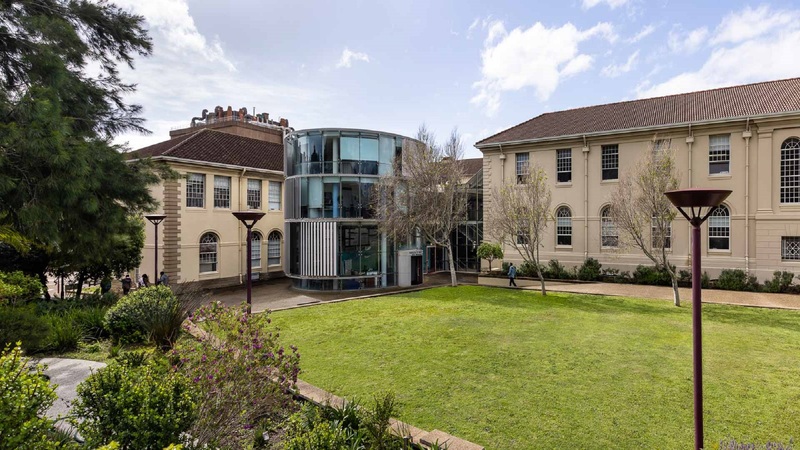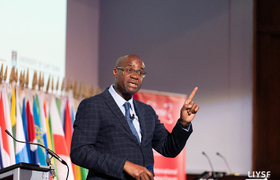IDM Africa’s first My Green Lab-certified academic research institute
17 October 2025 | Story Yulisha Naidoo. Photos Supplied. Read time 8 min.The Institute of Infectious Disease and Molecular Medicine (IDM) at the University of Cape Town (UCT) has become the first academic research institute in Africa to achieve My Green Lab certification.
Announced during the Sustainable Science at the IDM: One Year, One Big Reveal event on 3 October, the certification reflects the IDM’s commitment to integrating environmental responsibility into all its scientific operations.
Jack O’Grady, the director of certifications at My Green Lab, commended the IDM on their achievement. “This accomplishment reflects a strong commitment to sustainable science and demonstrates true leadership in integrating environmental responsibility into research practices. By achieving this distinction, the IDM and the University of Cape Town are setting the example for laboratories across Africa and indeed to others around the world.”
A milestone for sustainable science
The certification was awarded to two IDM laboratories: the Biological Safety Level 3 (BSL3) laboratory and the Proteomics and Metabolomics laboratory.
The IDM’s BSL3 Laboratory has achieved Green Certification, which is the highest level possible, while the Proteomics and Metabolomics Laboratory earned Platinum status, the second-highest distinction.
As core technology platforms, both laboratories support multiple research groups and house cutting-edge equipment that advance infectious disease research across the institute. What makes this achievement remarkable is the BSL3 focuses on pathogenic microbes, which requires strict containment and complex workflows. Demonstrating that even such high-intensity, multi-use research environments can successfully integrate sustainable practices, this milestone sets a new standard for responsible scientific practice.
“This milestone marks a transformative step in how we conduct science.”
These achievements were driven by Selisha Naidoo, the institute’s biosafety, research infrastructure and compliance manager; and the IDM Operations Team. They implemented a series of simple but impactful measures: switching off unused lights and equipment, installing water restrictors, minimising waste, and developing new protocols for sustainable laboratory operations.
“This milestone marks a transformative step in how we conduct science. By leading through example, we affirm that as scientists we hold a responsibility to advance research in ways that safeguard the very future we aim to protect,” said Naidoo.
She noted that these small, consistent actions have collectively contributed to significant sustainability gains between the baseline report and certification, showing that change is possible even in resource-intensive research environments.
Partnerships driving progress
A key component of the IDM’s sustainability programme involves a close partnership with UCT’s Properties and Services department (P&S), which is overseeing a state-of-the-art solar PV installation in the institute. The project will see approximately 260 solar panels installed, generating 176 kWp of renewable energy. Once operational, it is projected to reduce the IDM’s carbon footprint by about 211 tonnes annually. This is equivalent to planting 9 700 trees every year. Phase 1 of installation is scheduled for completion by the end of this year.
“We at Properties and Services are extremely proud and excited to be part of the IDM Sustainable Science Initiative,” said Avinesh Dhevdath, who is the electrical engineer for this project and the acting director of Programme Management at Properties and Services. “The 176 kWp solar plant marks a significant milestone for UCT, advancing renewable energy diversification and supporting UCT’s vision of a green, sustainable campus. As one of the largest solar systems ever installed at the university, it demonstrates UCT’s dedication to innovation and environmental leadership. We look forward to being part of many more.”
The partnership between the IDM and P&S reflects a shared vision to align UCT’s scientific excellence with environmental stewardship.
Sustainability in action
Through the Sustainable Science Initiative (SSI), the IDM is already achieving measurable environmental improvements across its research facilities. Water conservation efforts have been boosted by the installation of water restrictors across laboratories, which are expected to save between 1.7 and 2.5 million litres of water each year.
Energy efficiency interventions, such as switching off LED lights overnight across more than 50 laboratories, are saving an estimated 328 500 kW hours of electricity every year, equivalent to the annual energy consumption of 110 households.
For IDM director, Professor Digby Warner, the certification represents not only a sustainability milestone but also a triumph of teamwork within the Institute and across the university.
“This first major milestone provides an example of what is possible for research institutes such as the IDM which commit to smarter, greener operations.”
“Achieving My Green Lab certification is a testament to the dedication and ingenuity of our professional support teams within the IDM, backed up by key partners across the university, and matched by the commitment of our research groups to adjust their practices towards a common goal,” he said. “It demonstrates that high-impact scientific research and sustainability are not incompatible; in fact, through this process, we’ve already seen significant improvements in workflow efficiencies and costings, while fulfilling our responsibility to take much greater cognisance of our environmental impact as researchers. Perhaps most importantly, this first major milestone provides an example of what is possible for research institutes such as the IDM which commit to smarter, greener operations.”
Looking ahead
Building on this success, the IDM is expanding its sustainability efforts through several upcoming projects. These include a hydration station project, which is expected to prevent around 125 000 plastic bottles from reaching landfills each year. The roll-out of new waste segregation protocols will streamline recycling and disposal processes across the institute. Focusing on plastic waste reduction, an estimated 2 000 kg of laboratory plastic waste will be diverted from landfill annually through a dedicated recycling programme.
“The university is incredibly proud of what the IDM team … has achieved here in terms of environmental sustainability goals.”
A sustainable procurement guide is being implemented to prioritise ACT-certified suppliers and products bearing the My Green Lab ACT Ecolabel, which helps laboratories make informed, environmentally responsible purchasing decisions. The ACT label rates products on their environmental impact, including energy and water use, chemical safety, materials, and end-of-life options, ensuring greater accountability, consistency, and transparency.
Looking ahead, the IDM will also release its Carbon Footprint Report in the final quarter of the year, which will outline ongoing progress and identify new sustainability targets.
Through its ongoing sustainability journey, the IDM continues to lead by example, proving that scientific excellence and environmental responsibility can thrive side by side.
Said Manfred Braune, UCT’s director of Environmental Sustainability: “The university is incredibly proud of what the IDM team, led by Selisha Naidoo, has achieved here in terms of environmental sustainability goals. It took an extraordinary effort, passion, commitment and leadership that can serve as a wonderful example of what is possible in our South African university laboratories when it comes to practicing sustainable science. Well done to all involved!”
 This work is licensed under a Creative Commons Attribution-NoDerivatives 4.0 International License.
This work is licensed under a Creative Commons Attribution-NoDerivatives 4.0 International License.
Please view the republishing articles page for more information.











